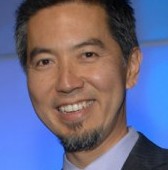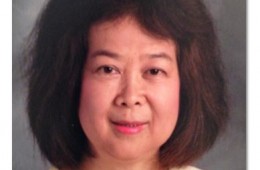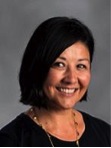2015 Award Recipients
Mr. Yo Azama
Japanese Language Category
Teacher of Japanese Language
North Salinas High School, Salinas, CA
Yo Azama is a passionate, intelligent, humorous, innovative language teacher and professional speaker. He firmly believes the study of languages and cultures help learners gain new perspectives and provide opportunities to find who they are and their roles in the world. His passion and enthusiasm for sharing the Japanese language and culture with his students encouraged him to work diligently at building the Japanese programs at all high schools in his district. Currently all high schools offer full-time Japanese programs and the number is growing.
His classes are conducted entirely in Japanese. This not only creates a Japan-like environment, but it also fosters students’ curiosity to guess and make meaning of language in situations. Each lesson begins with essential questions students explore such as “Is a Japanese diet really healthier?” or “What are concerns of Japanese teens?” or “What’s the latest trend in fashion and music among Japanese teens?” These essential questions are used as hooks and presented with cultural artifacts such as Japanese recipe book, newspaper articles, or informational graphs. He believes curiosity can take students far.
Lesson outcomes are always practical and purpose driven. He incorporates activities that address various types of learning styles so that all students can learn at their best. It is common to see his students moving around to interview other classmates, collaborating in pairs, or working individually during a lesson. Laughter is constant and a positive atmosphere is perhaps the signature of his classroom. Taking risks and making mistakes in language learning are encouraged. Also common in his classroom is the integration of technology in his lessons. Since many of his students don’t have computers at home, he believes in the importance of providing opportunities to learn and create with technology. As a result, his students have produced creative projects and many opportunities to share them with other language teachers as well as Japanese teachers across the nation.
Yo’s interest with the Japanese language is not limited to the classroom. He continually encourages his students to use their language skills after high school not just to order a Japanese meal in a restaurant or to vacation in Japan; he challenges his students to apply for scholarships that will take them to that county for college and eventually for life. A number of his former students are currently learning and/or working in Japan.
In order to promote students’ success, Yo started the annual Monterey County Japanese Language Speech Contest almost a decade ago. Though this contest mainly benefits the students, Yo has used this contest also to help develop the organizational skills of his many student teachers and new teachers to the district. He encourages them to host the contest at their schools each year while supporting them. This mentorship is what makes the Japanese program in the district a success.
Yo has also developed strong connections with a few high school teachers in Japan to organize an exchange program with North Salinas High School. High school students from Japan have stayed with Salinas host families to experience American culture and Yo’s colleagues and students have enjoyed the rich experience of having a Japanese student live with them for a few days. His Salinas students who have never even travelled outside of their town have raised enough money to visit Japan, stay with host families, and see places and do things they have only studied in books. Studying with Azama Sensei has also inspired female students whose only goals in life were to attend the local junior college, find jobs at the shopping mall, and eventually get married. Discovering life outside the small rural town of Salinas has opened students’ eyes to attending 4-year universities and believing that there may be greener pastures outside Steinbeck country.
Yo has also grown with the students and the program. Since teaching at NSHS, he has introduced the Japanese program in every high school in the district. In addition, this 20-year veteran educator has been the recipient of prestigious honors such as the 2012 ACTFL Language Teacher of the Year, Outstanding Teacher of America Award by Carlston Family Foundation, the Robert J. Ludwig Distinguished Leadership Award, PacTin Grant Recipient, and the Ericia Harden Memorial Teaching Excellence Award just to name a few. His teaching has been featured in the Teaching Foreign Languages K-12 Video Library by WGBH of Boston in 2003 and has been used in Professional Development and method courses.
Yo is passionate and enthusiastic not just about teaching Japanese language, but language in general. He believes “language connects us and as a result it binds us into the global family that we are.” He has given over two hundreds presentations, workshops, seminars, webinars, and keynote addresses on various topics of language learning locally, regionally, nationally, and internationally.
His academic background includes a Bachelor of Arts from Showa Academia Musicae in Kanagawa Japan, and he received his Master’s Degree in Education from California State University in Monterey Bay, California. He holds a single subject credential from that university’s program as well and has a multiple subject teaching credential from the New College of California.
In addition to his busy full-time teaching career, Yo is a team leader of the Monterey Bay World Language Project and serves as a College Board Advisor for the AP Japanese Language and Culture Development Committee. He also teaches a world language method course at California State University, Monterey Bay. He is widely published and is a highly sought-after professional speaker and seminar leader in the field of language education throughout the US and Canada.
Ms. Hiroko Darnall
Japanese Language Category
Japanese-English Dual Language Teacher
Thomas Dooley Elementary School, Schaumburg, IL
Ms. Hiroko Darnall has been teaching in the Japanese-English Dual Language Program at Thomas Dooley Elementary School in Schaumburg (IL) District 54 since the earliest years of the program. One of the first of its kind, Dooley’s innovative program continues to draw observers and researchers from universities and organizations in both the U.S. and Japan. Mrs. Darnall plays an important role not only in developing the dual language curriculum but also in helping the community recognize and celebrate Japanese culture.
From the beginning, she was involved in setting up the Japanese dual language program at Dooley and helped in the final proposal presentation to the board of education. She helped lead a variety of efforts to familiarize Dooley’s regular student body and staff with the new program and culture. Over the years, she has helped organize various cultural events, develop curriculum, and mentored new dual language teachers. To further enhance the appreciation of Japanese culture, Hiroko also helped launch Dooley’s Japanese speech and chorus clubs.
Mrs. Darnall’s dual language classes consist of approximately half Japanese native speakers and half English-speaking students. They often work in pairs for activities, sharing materials and helping one another with assignments and projects. The partner interactions promote authentic communication as the students strive to get their messages across. After more than a decade teaching first grade, Mrs. Darnall now teaches third graders and is delighted to see their growth, not only in academic areas but in the target languages for both groups of students.
Hiroko’s teaching career began well before her work with the dual language program. Previously, she taught ESL and Japanese bilingual in District 54. Prior to moving to Schaumburg, she lived in Bloomington-Normal, IL, where she taught ESL at various grades and Japanese at the high school, college, and adult education levels. She also helped the community and schools there prepare for the arrival of a major Japanese automobile plant, its suppliers, and the families that came to live in the community as a result. She has worked in summer language/culture programs for children as well.
Furthermore, Hiroko has made significant contributions to Japanese language assessment. In addition to serving as a language proficiency evaluator for teacher certification, Hiroko was the Japanese language representative on content advisory and coordinating committees for the Illinois State Board of Education (ISBE), working with National Evaluation Systems to develop tests for bilingual certification. She also helped develop and pilot the Japanese language version of the National Online Early Language Learning Assessment (NOELLA), part of a project commissioned by the Center for Applied Second Language Studies.
Mrs. Darnall’s contributions to Japanese dual language teaching reach beyond her school. She contributed model unit and lesson plans to The Two-Way Immersion Toolkit, published by the Northeast and Islands Regional Educational Laboratory at Brown University through the Center for Applied Linguistics (CAL). She presented on dual language programs at an immersion conference organized by CAL and the Center for Advanced Research on Language Acquisition (CARLA) and has spoken at Illinois statewide conferences.
She has always tried to make a difference in her community. Her non-teaching involvement has included helping the Asahikawa-Bloomington-Normal Sister City program, volunteering at the Chicago Japan Festival, proctoring the yearly Japanese Language Proficiency Test, and helping extensively to support an annual Japanese exchange program at a nearby high school. She has served on numerous committees at the school and district levels, received a District 54 Excellence in Education Award, and been nominated for the Illinois Golden Apple Teacher Award.
Mrs. Darnall states, “It has been an honor and privilege to share my language and cultural heritage with students. The process of applying for the Elgin Heinz award was a wonderful chance to reflect on my teaching and to think of new ways I might help students better acquire Japanese and increase their appreciation of the language and culture. I fully realize that I am only one of many who dedicate themselves to opening students’ eyes to the world and increasing cross-cultural understanding through the teaching of Japanese. I am humbled by my being selected for this recognition.”
Ms. Saya McKenna
Humanities Category
Teacher of History and English
The Head-Royce School, Oakland, CA
Saya Okimoto McKenna has a long-standing personal interest in US-Japan relations. She is herself bi-racial–the daughter of a Nissei Professor of Japanese Political Economy and an International Studies program administrator from Boise, Idaho. Raised in Silicon Valley in the 1980s, a period of increasing economic interdependence and trade tensions between the US and Japan, Saya grew up hosting Japanese exchange students, and frequently tagged along to conferences where academics, MITI officials, and industry representatives worked to further the US-Japan strategic relationship. She also lived abroad with her family in Tokyo.
A number of influential Humanities teachers inspired Saya to earn a BA in International Relations from Stanford University, to study abroad, and to pursue to a career as a secondary school educator. Saya currently teaches at the Head Royce School in Oakland, California. Since 2002, she has worked to build a strong Global Education program with a particular focus on the Pacific Rim. Her senior history elective, Asia Rising, uses current events to connect to topics in economics, international relations, and comparative politics. She requires her students to pursue real-world research projects that speak to personal connections and ask hard-hitting, practical questions: What are the political factors that allowed for the advent of high-speed rail in Japan, and why is the initiative to bring high-speed rail to California is so hotly contested here at home? How does the Fukushima nuclear disaster reflect Japan’s struggle with energy security and what is the current implication of its heavy reliance on nuclear power? How does this relate to US energy policy? How does the “story of our stuff” reflect the US economic relationship with Japan and East Asia? Ultimately, Saya’s hope is that upon completion of this course, her students will be better informed about the modern history of US-Japan relations, as well as the economic history of the region and the current events that continue to shape Asia’s economic and social development.
Saya chairs the Head Royce K-12 Global Citizenship committee and recently designed and instituted a certificate program to commend students who demonstrate the qualities of global citizenship. Criteria include academic excellence, global studies related course work, mastery of a second language, inter-cultural exchange, civic leadership, and community service. As part of this certificate program, she teaches a capstone course of her own design, Global Issues: The Ethics of Global Citizenship. She also teaches English and serves as the Sophomore Dean. Saya currently sits on the board of the Global Education Benchmark Group and has been active in organizing professional development institutes for secondary school teachers interested in connecting the curriculum to world affairs.
Saya has taken students to Japan, Thailand, and Cambodia and planned school programs to Peru, Costa Rica, South Africa, and China. This summer, she will lead students on a study program to Japan that explores the relationship of man to land. Her students will work on organic farms in Kyushu, tour gardens in Kyoto, walk the historic Nakasendo Way, and visit Tsunami-hit areas of Tohoku. She looks forward to using the funds awarded Elgin-Heinz grant to support student travel scholarships, so that more students may travel to Japan on this educational program in years to come.





